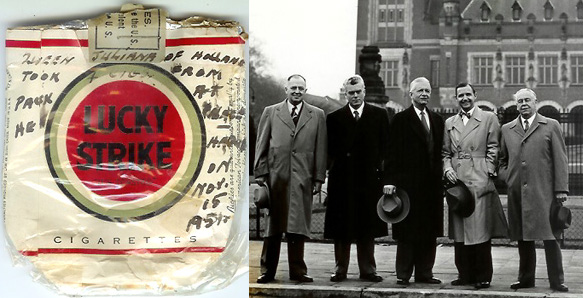It’s a battered pack of Lucky Strike cigarettes, with a few of them still inside, their innards having dried up and fallen out long ago. But, like the letters, photos and other papers of Congressman Frank Chelf housed in the Manuscripts & Folklife Archives collections of WKU’s Special Collections Library, it tells a story. Chelf himself thought it worthwhile to inscribe the pack of smokes with the notation that a queen had partaken of its contents.
During his 22 years representing Kentucky’s Fourth District in the U.S. House of Representatives, Frank L. Chelf (1907-1982) found himself in the heart of Cold War politics. In 1951, he and other members of the House Judiciary Committee took a month-long trip overseas to investigate the problems created by thousands of refugees fleeing Soviet-dominated countries for Western Europe. While visiting The Hague, Chelf and his colleagues met with Queen Juliana of the Netherlands, who had taken a particular interest in the issue. During World War II, Juliana herself had been forced to leave her country to live in Canada.
Expecting to take only 30 minutes of the Queen’s time, the group found her willing to talk for some two hours. Finally, Pennsylvania Representative Francis E. Walter got to his feet as if to take his leave. Inadvertently, he committed a diplomatic faux pas, for it was Juliana’s prerogative to decide when the meeting would end. But Chelf jumped in to smooth any ruffled feathers. He assured the Queen, who he knew understood American slang, that they didn’t want to “wear out their welcome.” And perhaps, his willingness to share a couple of cigarettes from his pack of Lucky Strikes had helped, too.
Click here to access a finding aid for the Frank Chelf Collection. The Manuscripts & Folklife Archives section of WKU’s Special Collections Library holds many other collections relating to Kentucky politics and politicians. For more information, search TopSCHOLAR and KenCat.


